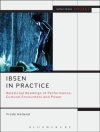It is often taken for granted that French cinema is intimately connected to the nation’s sense of identity and self-confidence. But what do we really know about that relationship? What are the nuances, insider codes, and hidden history of the alignment between cinema and nationalism? Hugo Frey suggests that the concepts of the ‘political myth’ and ‘the film event’ are the essential theoretical reference points for unlocking film history. Nationalism and the Cinema in France offers new arguments regarding those connections in the French case, examining national elitism, neo-colonialism, and other exclusionary discourses, as well as discussing for the first time the subculture of cinema around the extreme right Front National. Key works from directors such as Michel Audiard, Jean-Luc Godard, Jean-Pierre Melville, Marcel Pagnol, Jean Renoir, Jacques Tati, François Truffaut, and others provide a rich body of evidence.
Mục lục
Acknowledgements
Introduction: From International ‘High Art’ to the Parisian Political Melee
Chapter 1. The Cinema of Self-Promotion: Patriotic Subtexts in ‘Films about Films’
Chapter 2. The Search for National Unity through History
Chapter 3. The Representation of a Modern Chic People
Chapter 4. A Paradox in Anti-Americanism: Public Protest and on Screen Ambiguity
Chapter 5. The Maintenance of Neo-Colonial Attitudes
Chapter 6. The Persistence of anti-Semitism
Chapter 7. The Cinema and the Extreme Right-Wing Undercurrent
Conclusion
Bibliography
Index
Giới thiệu về tác giả
Hugo Frey is Head of Department and Professor of Cultural and Visual History at the University of Chichester, UK. He is the author of Louis Malle (2004) and co-author with Jan Baetens of The Graphic Novel: An Introduction (2015). He has published articles on historiography, cinema and graphic novels in journals such as Contemporary French Civilisation, Journal of European Studies, South Central Review, and Yale French Studies. Since the fall of 2013 he has been an invited guest lecturer on French cinema for the Prince’s Teaching Institute, London.












